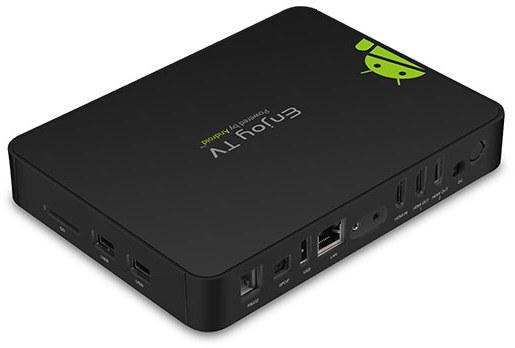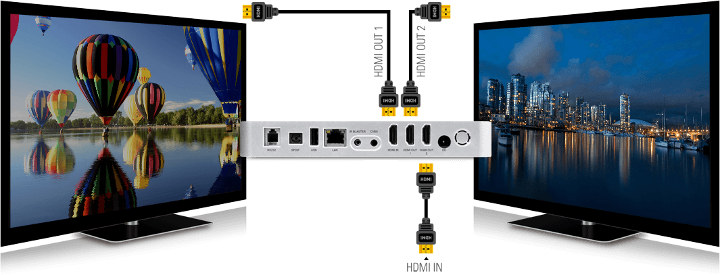There are many applications that may benefit from dual display support from digital signage to healthcare to retail or entertainment either to provide access to two different output for the service provider and customer or simply to mirror content. Most Android TV boxes only come with one display output however, so in most cases, you’d have to switch to an Intel mini PC or add a USB-C display adapter if supported by the hardware.
Geniatech ATV1660K TV box supports dual HDMI output out of the box, as well as HDMI input. The Android 5.1 TV box is powered by the time-tested Rockchip RK3288 processor and comes with 2GB RAM and 16GB storage by default.
 Geniatech ATV1660K specifications:
Geniatech ATV1660K specifications:
- SoC – Rockchip RK3288 quad-core Arm Cortex-A17 processor at up to 1.8GHz, with Mali-T764 GPU
- System Memory – 2GB DDR3 (1GB optional)
- Storage – 16GB eMMC flash (4GB-32GB optional), full-size SD card slot up to 32GB
- Video Output
- 2x HDMI 2.0 for 4K @ 60Hz with HDCP 1.4/2.2, CEC up to 4K + Full HD.
- 3.5mm AV jack for composite output
- Video Input – 1x HDMI input
- Audio Output – HDMI, RCA, and SPDIF ports
- Connectivity
- Gigabit Ethernet port
- 2.4GHz 802.11 b/g/n by default, upgradable to dual band
- USB – 3x USB 2.0 ports
- Misc – IR blaster jack, RS232 serial port (RJ45)
- Power Supply – 5V/3A
- Dimensions – 195x146x29 mm
- Weight – 392 grams

Geniatech ATV1660K runs a fairly ancient Android 5.1 operating system, and ships with AV and HDMI cables, a power adapter, an optional RF remote control, and a user manual.
While both outputs are HDMI 2.0 ports, the system can only support 4K UHD on one of the port, while the other can output up to 1080p “Full HD”. Also note that Rockchip RK3288 is one of the first 4K processor, so it had some limitations meaning on some TVs output would be limited to 4K @ 30 Hz. Also note that H.265 and VP9 video codecs are not supports, and the system can only play back 4K H.264 videos up to 24 fps. [Update: RK3288 also supports 10-bit H.265 contrary to what’s listed on Geniatech product brief]
The company also did a poor job at explaining the purpose of the HDMI input port, as in they did not explain the purpose at all. But I can only assume it’s made to connect an input device and overlay data over the video output using Geniatech SDK.
You may want to visit the product page for a few more details, and if interested, you can purchase the device on Geniatech store for $139, or request a volume quote.

Jean-Luc started CNX Software in 2010 as a part-time endeavor, before quitting his job as a software engineering manager, and starting to write daily news, and reviews full time later in 2011.
Support CNX Software! Donate via cryptocurrencies, become a Patron on Patreon, or purchase goods on Amazon or Aliexpress




